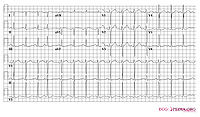Main Page: Difference between revisions
Jump to navigation
Jump to search
mNo edit summary |
mNo edit summary |
||
| Line 25: | Line 25: | ||
<div style="padding:10px"> | <div style="padding:10px"> | ||
{|width="85%" align="center" cellspacing="3" style="border: 1px solid #C0C090; background-color: #F8EABA; margin-bottom: 3px;" | {|width="85%" align="center" cellspacing="3" style="border: 1px solid #C0C090; background-color: #F8EABA; margin-bottom: 3px;" | ||
|align="center"| Contribute to this and other CardioNetworks websites, read our [[Call_for_Authors|call for authors]] | |align="center"| '''Contribute to this and other CardioNetworks websites, read our [[Call_for_Authors|call for authors]]''' | ||
|- | |- | ||
| | | | ||
Revision as of 21:37, 23 April 2010
|
| Contribute to this and other CardioNetworks websites, read our call for authors |
The ECG Course ECG course
|
The ECG Textbook |
Cases and Examples Cases:
Arrhythmia prone <CSO_iFrame> frameborder='0' src='http://zohopolls.com/external/cardionetworks/what-kind-of-tachycardia-is-shown-on-this-ecg' width='240' height='240'</CSO_iFrame> Answer |
Popular items
|
|
News & Background
|
<CSO_iFrame>frameborder='0' src='http://zohopolls.com/external/cardionetworks/ecgpedia-feedback-en' width='260' height='260'></CSO_iFrame> |
